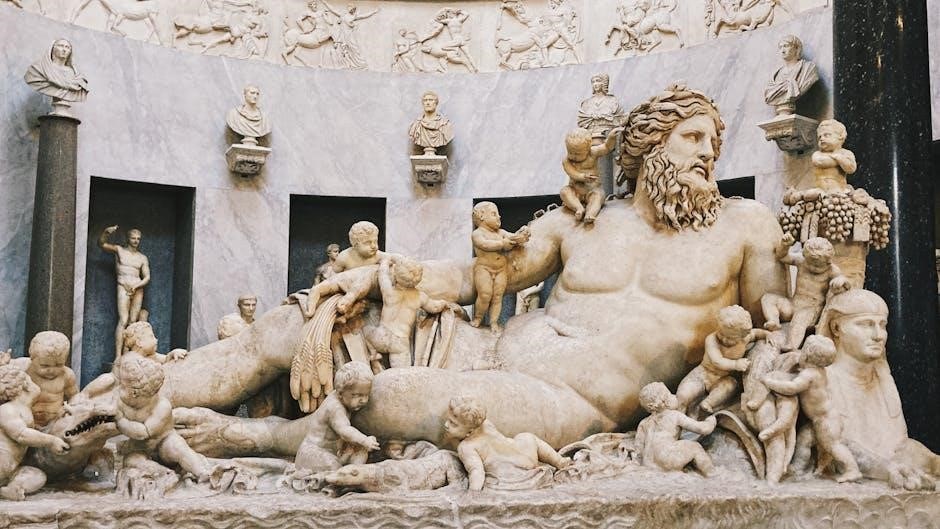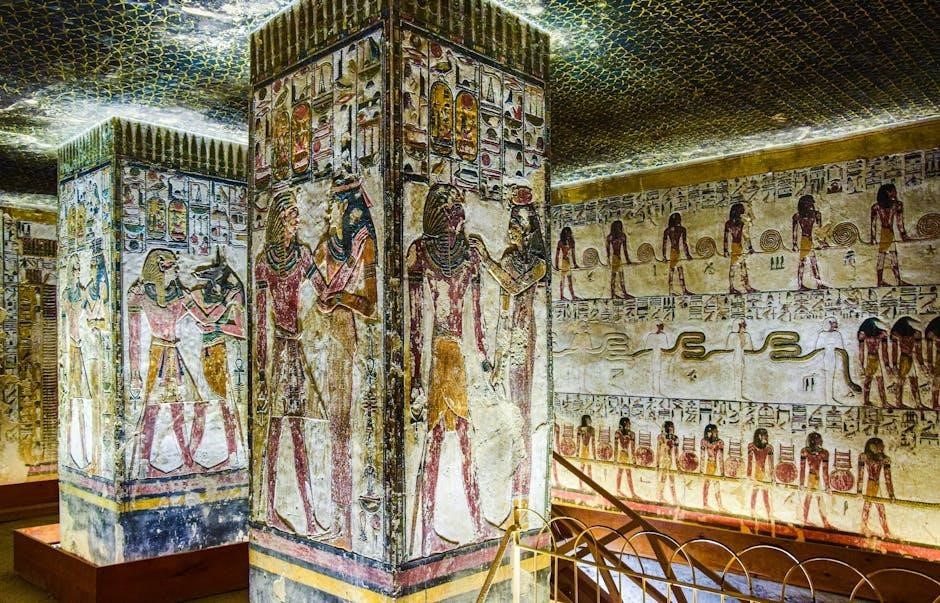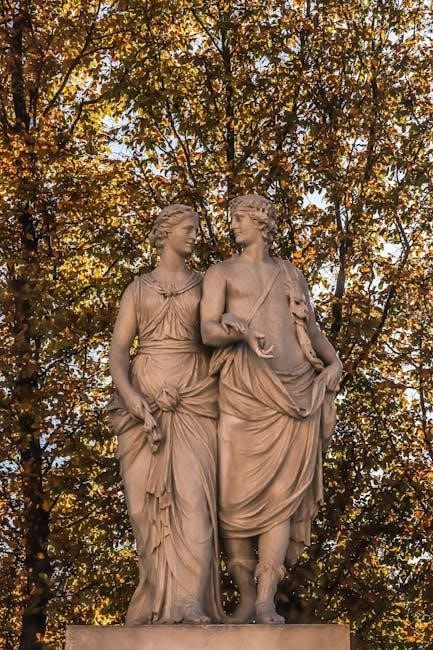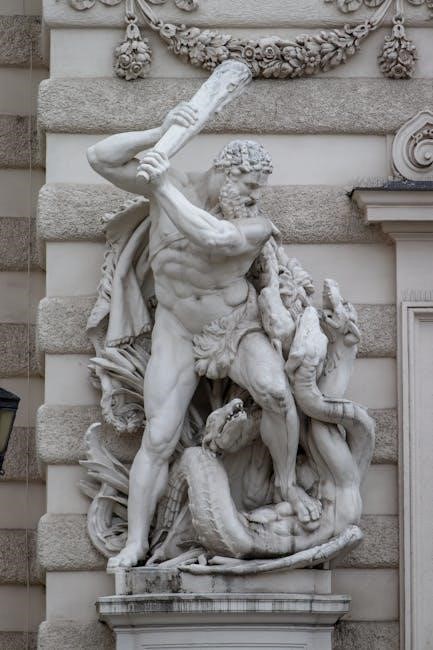Greek mythology is a timeless collection of stories exploring human nature, with heroes, gods, and monsters shaping ancient and modern culture through their enduring tales.
The Heroes of Greek Mythology
Greek heroes, often demigods or extraordinary mortals, performed remarkable feats, embodying human virtues and flaws while inspiring generations through their legendary quests and triumphs over adversity.
Characteristics of Greek Heroes
Greek heroes were often exceptional mortals or demigods, possessing remarkable skills, intelligence, or courage. They were celebrated for their bravery, selflessness, and ability to overcome extraordinary challenges. Many heroes, like Heracles and Achilles, were known for their superhuman feats, embodying both divine and human qualities. Their stories highlighted moral dilemmas, personal growth, and the struggle between fate and free will. Despite their flaws, heroes inspired admiration and emulation, serving as role models in ancient Greek culture. Their quests often benefited humanity, showcasing virtues such as loyalty, honor, and wisdom. Through their journeys, Greek heroes bridged the gap between mortals and gods, making their legacies timeless and universally relatable.
Notable Heroes and Their Stories
Greek mythology is rich with legendary heroes whose adventures captivate audiences. Heracles, known for his twelve labors, symbolized strength and perseverance. Perseus, the slayer of Medusa, exemplified wit and bravery. Theseus, who defeated the Minotaur, represented courage and sacrifice. Their stories, filled with challenges and triumphs, highlighted human virtues and the influence of the gods. Each hero’s journey uniquely contributed to the cultural tapestry, inspiring generations with tales of resilience and heroism. Their legacies endure, making them central figures in Greek mythology, celebrated for their remarkable deeds and timeless appeal.
The Gods of Greek Mythology
Greek mythology features powerful gods like Zeus, Hera, and Apollo, who ruled the universe with divine authority, influencing human fate and shaping the world’s destiny.
The Olympian Gods and Their Roles
The Olympian gods, residing atop Mount Olympus, were central to Greek mythology. Zeus, as king of the gods, ruled the skies and governed law and order. Hera, his queen, presided over marriage and family. Apollo, the god of the sun, prophecy, and music, embodied wisdom and creativity. His twin sister, Artemis, was the goddess of the hunt and protector of the wilderness. Athena, the goddess of wisdom and war, was revered for her strategic mind, while Ares, the god of war, represented conflict and violence. Poseidon, ruler of the seas, controlled the tides and earthquakes. Dionysus, the god of wine and festivities, symbolized celebration and ecstasy. These gods were believed to influence human affairs and the natural world, shaping the destiny of mortals and immortals alike. Their stories, filled with power and drama, remain central to Greek mythological narratives.
- Zeus: King of the gods, ruler of the sky.
- Hera: Queen of the gods, goddess of marriage.
- Apollo: God of the sun, prophecy, and music.
- Athena: Goddess of wisdom and warfare.
- Poseidon: God of the sea and earthquakes.
- Dionysus: God of wine and festivities.
Key Gods and Their Influence
The Olympian gods wielded immense influence over ancient Greek life, shaping culture, religion, and daily practices. Zeus, as king, controlled the skies and upheld justice, while Hera, his queen, governed marriage and family, reflecting societal values. Apollo’s influence extended to the arts, prophecy, and medicine, inspiring creativity and wisdom. Athena, revered for her strategic mind, became a symbol of warfare and wisdom, embodying the ideals of the city-state of Athens. Poseidon’s dominion over the seas impacted maritime activities, vital to Greece’s economy. Dionysus, god of wine and festivities, inspired theater and celebration, leaving a lasting legacy in the arts. Their stories and roles not only explained natural phenomena but also guided moral and cultural norms, enduring in Western civilization’s consciousness.

The Monsters of Greek Mythology
Greek mythology teems with terrifying creatures like the Minotaur, Centaurs, and Chimera, embodying chaos and danger, while heroes rise to conquer them, defining legendary tales.
Famous Monsters and Their Stories
Greek mythology is rich with terrifying creatures that captivated ancient audiences. The Minotaur, a half-man, half-bull, was trapped in the Labyrinth, feeding on human sacrifices until defeated by Theseus. The Chimera, a monstrous hybrid of lion, goat, and serpent, terrorized Lycia before being slain by Bellerophon. Medusa, the snake-haired Gorgon, turned men to stone with her gaze, meeting her end at Perseus’s hand. Typhon, a fearsome giant, challenged the Olympian gods but was ultimately overthrown. These monsters symbolized chaos and danger, testing heroes’ courage and ingenuity. Their stories, passed down through generations, remain central to Greek mythology’s legacy, offering insights into human fears and the triumph of order over disorder.
The Role of Monsters in Greek Myths
Monsters in Greek mythology serve as powerful symbols of chaos, fear, and the unknown, often representing the forces of nature or moral dilemmas. They challenge heroes, testing their courage and wits, and highlight the gods’ authority. Creatures like the Minotaur, Chimera, and Medusa embody terrifying aspects of existence, while others, such as Typhon, signify cosmic threats. These beings often guard sacred sites or possess supernatural powers, underscoring the dangers of hubris and the necessity of divine intervention. By confronting monsters, heroes demonstrate their worth, reinforcing societal values and the balance between order and chaos. Monsters also explain natural phenomena and cultural beliefs, making them integral to the rich tapestry of Greek myths and their enduring legacy in storytelling and human imagination.

Bernard Evslin and His Work
Bernard Evslin was a renowned author of Greek mythology, best known for “Heroes, Gods, and Monsters,” which has sold millions worldwide and earned multiple awards.
About the Author and His Contributions
Bernard Evslin (1922–1993) was a celebrated author and expert on Greek mythology. Born in New Rochelle, New York, he began his career as a playwright and screenwriter before transitioning to novels. His bestseller, Heroes, Gods, and Monsters of the Greek Myths, has sold over ten million copies worldwide and been translated into ten languages. Evslin’s work bridges ancient myths with modern storytelling, making them accessible to readers of all ages. He won the National Education Association Award in 1961 and the Washington Irving Children’s Book Choice Award in 1986. His writing captivated both children and adults, inspiring a deeper appreciation for mythology. Evslin’s legacy endures as a masterful interpreter of classical myths for contemporary audiences.
The Impact of “Heroes, Gods, and Monsters of the Greek Myths”
Bernard Evslin’s Heroes, Gods, and Monsters of the Greek Myths has left an indelible mark on literature and education. Since its release, it has sold over ten million copies worldwide, translated into ten languages, making it a global phenomenon. The book’s accessible storytelling has introduced countless readers to Greek mythology, appealing to both children and adults. Its influence extends to schools, where it is widely used as a classroom resource, fostering a love for mythology in young minds. Evslin’s work has also inspired adaptations and further explorations of myths in popular culture, ensuring the timeless stories remain relevant. This book’s enduring popularity underscores its role in preserving and celebrating the rich tapestry of Greek myths for future generations.

Cultural Significance and Legacy
Greek myths, as presented in Heroes, Gods, and Monsters of the Greek Myths, have profoundly shaped modern culture, influencing films, literature, and art, ensuring their timeless relevance globally.
Influence of Greek Myths on Modern Culture
Greek myths, as retold in Heroes, Gods, and Monsters of the Greek Myths, have left an indelible mark on modern culture. The book’s engaging storytelling has inspired films, novels, and art, making ancient tales relevant today. Its influence is evident in popular works like Rick Riordan’s books, which draw heavily from Greek mythology. The myths’ universal themes—heroism, morality, and the struggle between fate and free will—resonate across generations. Bernard Evslin’s work has been a classroom staple, introducing millions to these stories, ensuring their enduring legacy. By making mythology accessible, the book has fostered a deep appreciation for these timeless narratives, blending education with entertainment for readers of all ages.
Educational Value and Popularity of the Book
Educational Value and Popularity of the Book

Heroes, Gods, and Monsters of the Greek Myths is celebrated for its educational value and enduring popularity. The book’s clear narrative makes Greek mythology accessible to readers of all ages, from students to adults. Its concise storytelling has made it a classroom staple worldwide, introducing millions to ancient tales. With over 10 million copies sold and translations in 10 languages, the book’s success underscores its broad appeal. Customers praise its readability and engaging style, with many highlighting its ability to captivate children and inspire further exploration of mythology. Bernard Evslin’s work has been recognized with awards, solidifying its place as a cherished resource for both education and entertainment. Its popularity endures, making it a timeless bridge to the world of Greek myths.
Greek mythology remains an enduring and captivating force, offering insights into human nature and culture. Bernard Evslin’s Heroes, Gods, and Monsters of the Greek Myths has played a pivotal role in popularizing these stories, making them accessible to a wide audience. The book’s clear, engaging style has educated and entertained millions, bridging ancient tales with modern readers. Its success reflects the timeless appeal of Greek myths, which continue to inspire art, literature, and film. By preserving these stories, Evslin’s work ensures their relevance for future generations, fostering a deeper understanding of the cultural and historical significance of Greek mythology.